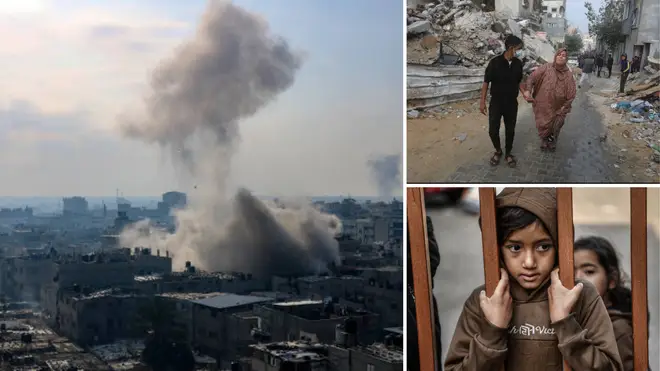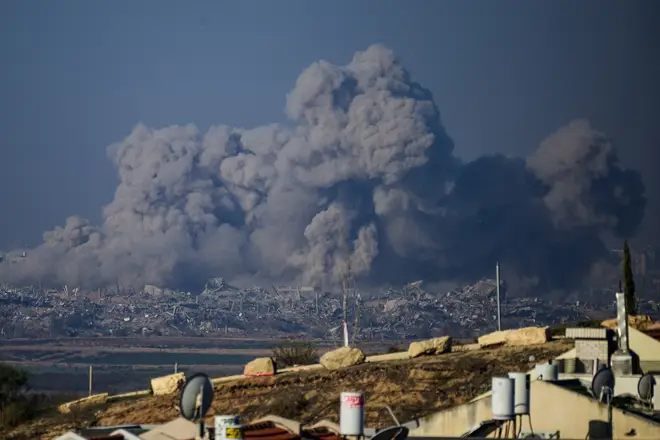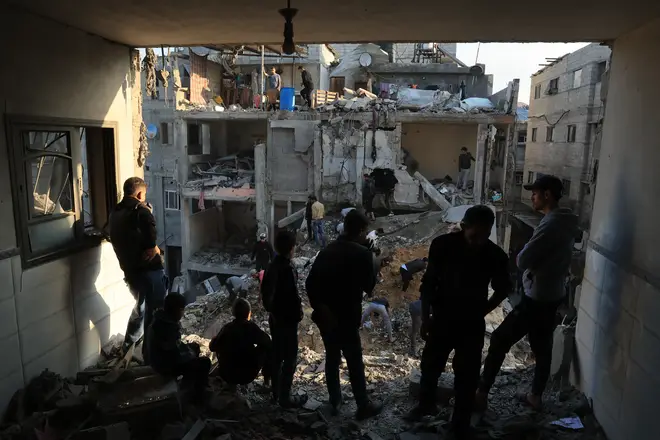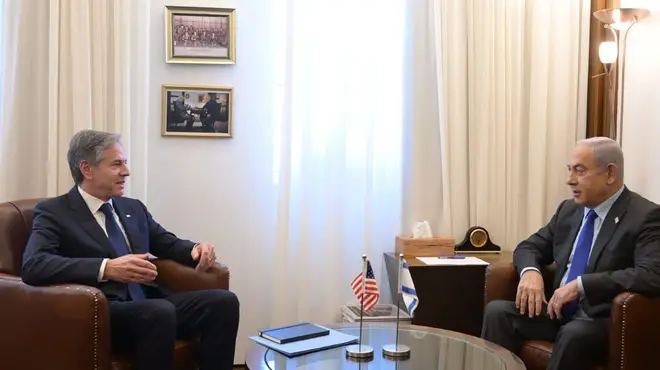
Ali Miraj 12pm - 3pm
1 December 2023, 05:21 | Updated: 1 December 2023, 08:56

Israel said the conflict with Hamas had restarted after seven days of truce, as the IDF said it had intercepted a missile fired from Gaza around an hour before the deadline ran out on Friday morning.
International mediators the US, Egypt and Qatar had been racing to prolong the pause in fighting, which came into effect on November 24, nearly a week ago.
The deadline, which expired at 5am UK time (7am local time) on Friday, had already been extended from its original four-day span.
Both sides blamed each other for violating the terms of the truce. Israel said that rockets had been fired from Gaza, while Hamas claimed that the IDF had blocked fuel from entering the territory.

Israel said that the fighting had resumed on Friday morning. The army said in the minutes following the end of the truce that it had begun bombing southern Gaza, and Hamas said that 32 people had been killed since the truce ended.
Palestinian residents of the southern city of Khan Younis said leaflets had been dropped warning them to go to a shelter area in Rafah, as their city is now "a dangerous combat zone".
Sirens were also heard in three southern Israeli communities after the end of the truce.
Announcing the resumption of hostilities, the IDF said: "Hamas violated the operational pause, and in addition, fired toward Israeli territory.
"The IDF has resumed combat against the Hamas terrorist organization in the Gaza Strip."

Israeli Prime Minister Benjamin Netanyahu said that Hamas did not agree to let out more hostages.
His office said in a statement: "With the resumption of fighting we emphasise: The Israeli government is committed to achieving the goals of the war - to free our hostages, to eliminate Hamas, and to ensure that Gaza will never pose a threat to the residents of Israel."
Rishi Sunak called for more humanitarian pauses after news of the end of the truce emerged.
He told reporters in Dubai: "Obviously this is news that has just broken in the past few minutes so I need to get into the details of it. It wouldn't be right to speculate so early.
"But I am having meetings with leaders from around the region in a matter of hours to discuss the situation.
"We've been consistent that we want to see sustained humanitarian pauses so that more aid can get into the people of Gaza but also the hostages can come out. Those are critical ingredients. And as we've said everyone needs to adhere to the terms of these agreements."

Some 105 of the roughly-240 hostages taken by Hamas were released over the seven-day truce period.
Ten were released on Thursday. 240 Palestinians were let out of Israeli prisons over the week-long period in exchange.

The pause in fighting had allowed more humanitarian aid to get into Gaza, where many residents desperately need food, medicine and fuel amid the bombardment.
More than 15,000 people in Gaza have died since Israel began its bombardment, followed by a ground invasion, according to Palestinian authorities.
That came after Hamas attacked southern Israel on October 7, killing 1,200 people and taking the hostages.
As the truce expired on Friday morning, reports came in of explosions around northern Gaza - the key battlefield in Israel's efforts to wipe out Hamas as a serious threat to its security.
Eyewitnesses reported military aircraft and drone activity in the northern part of the territory, AfP said, while explosions and gunfire were also said to be heard in the area, according to Reuters, who were citing Hamas-affiliated media.

Israel said that it had intercepted a rocket fired from Gaza, around an hour before the truce deadline ran out.
The Israel Defence Forces [IDF] said its aerial defence array blocked the missile following an "initial report regarding sirens sounded in communities near the Gaza Strip".
Mark Regev, an adviser to Mr Netanyahu, said earlier that his country was open to continuing the truce if Hamas would commit to releasing more hostages.
As the truce began nearly a week ago, Israel was said to have been preparing to focus its military activities more on southern Gaza, where it told civilians to move to when it began its attack on the north.
Anthony Blinken, the US Secretary of State, warned that the next phase of fighting could not see a repeat of the scenes in the opening weeks of the war, with so many civilians killed.

"We discussed the details of Israel's ongoing planning and I underscored the imperative for the United States that the massive loss of civilian life and displacement of the scale that we saw in northern Gaza not be repeated in the south," Mr Blinken told reporters.
He added: "Israel has one of the most sophisticated militaries in the world. It is capable of neutralising the threat posed by Hamas, while minimising harm to innocent men, women and children".
Hundreds of lorries full of aid have entered Gaza with medicines, food, fuel and other supplies since the truce began. Another 56 came in on Thursday.
But aid workers have said the quantities arriving in Gaza are still not enough, with 2.3 million people in the strip, and hundreds of thousands of them displaced from their homes amid the conflict.